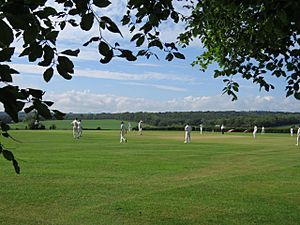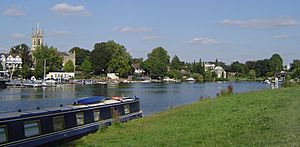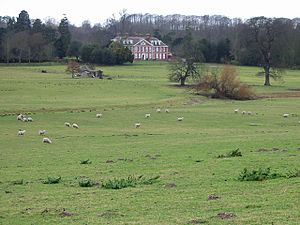Will Palmer (cricketer) facts for kids
| Personal information | |
|---|---|
| Full name |
William Palmer
|
| Born | 1737 Coulsdon, Surrey |
| Died | February 1790 Coulsdon |
| Role | Batsman |
| Domestic team information | |
| Years | Team |
| ?–1784 | Coulsdon Cricket Club |
| 1768–1769 | Caterham Cricket Club |
| 1772–1773 | England |
| 1773–1776 | Surrey |
| 1776 | Kent |
|
Source: CricketArchive, 20 September 2022
|
|
William Palmer (born 1737, died 1790) was an English cricketer. He played during the 1760s and 1770s. William was born and died in Coulsdon, Surrey. He was a top-order batsman, meaning he was good at hitting the ball. He played for his local team, Coulsdon Cricket Club. He also played county cricket for Surrey.
Most of Palmer's career happened before cricket records were kept well. This means we don't know many details about his early games. However, he regularly played in important matches until 1776. Records show he played in 24 matches with eleven players on each side. He also played in one top-level single wicket match. He was last recorded playing for Coulsdon in 1784. He was 47 years old at that time.
Contents
William Palmer's Cricket Journey
Starting His Career (1768-1772)
William Palmer was born in Coulsdon, Surrey in 1737. His first known cricket match was on 10 June 1768. He played for Bourne Cricket Club against Caterham Cricket Club. This match was at Westerham Common. Palmer was already 31 years old when he started playing.
In that first match, Caterham scored 63 runs. Bourne then scored 60 runs in their first innings, with Palmer scoring 12. Caterham scored 150 more runs. Bourne needed 154 runs to win. Palmer scored 23 runs, but Bourne lost the match by 14 runs.
In 1769, Palmer played for Caterham against Hambledon. This game was at Guildford Bason. We know the team scores, but not how each player did. Caterham scored 104 and 137 runs. Hambledon won by 4 wickets. An old report said 20,000 people watched this match.
Palmer is not mentioned in reports from 1770 and 1771. In 1772, he played two matches for an England XI. They played against Hampshire. The first game was at Broadhalfpenny Down. The second was at Bourne Paddock.
In the first match, Hampshire won by 53 runs. Palmer scored 13 and 8 runs. At Bourne Park, England won by 2 wickets. Palmer scored 29 runs, which was the highest for his team. England won by 2 wickets. A song was even written to celebrate this victory. It named all the England players:
Palmer's Best Season (1773)
The year 1773 was Palmer's best known season. He played in eight important matches with eleven players per side. He also played in one top-level single wicket game. This single wicket match was on 2 June. England, including Palmer, won by 1 wicket. Palmer scored 1 run in both innings.
Palmer first played for Surrey on 21–22 June. They played against Kent. Surrey won by 35 runs. Palmer scored 8 and 5 runs in this game.
He had a great match on 2–3 July. England beat Hampshire by 6 wickets. Palmer scored 52 not out in the first innings. He then scored 30 not out in the second innings. He had a total of 82 runs and was not out in both innings.
On 19–21 July, Palmer played for Surrey again. Surrey beat Kent by 153 runs. Palmer scored 22 runs in the first innings. He then added 38 runs in the second innings. Another song was written to celebrate Surrey's win. It was called Surrey Triumphant. One line said: "Palmer, for batting well esteemed."

Palmer made his highest known score in his next match. He scored 68 runs for England against Hampshire. This was on 4–5 August. At that time, scoring over 50 runs was very rare. The playing fields were not very good, which made it hard for batsmen.
Hampshire scored 89 runs. Palmer and Thomas White then made a great partnership. Palmer scored 68 runs and White scored 69. England ended up with 202 runs. Hampshire scored 140 runs. England won by 9 wickets. Palmer, who was a long stop fielder, also caught a player out.
Palmer played for Surrey in four more matches in 1773. In one game, he scored 20 runs in both innings. Surrey lost this match by six wickets. In another game, Surrey won by six wickets. Palmer scored 16 and 6 runs.
Surrey won another match by 8 wickets. Palmer scored 6 runs in the first innings. In the last match of September, Surrey won by a lot. Palmer scored 14 runs. His teammate William Yalden scored 88 runs, which was a very high score then.
Later Matches (1774-1776)
In 1774, Palmer played for England against Hampshire. England lost badly. Palmer scored 0 and 6 runs in his two innings. In a return match, England lost again. Palmer scored 3 and 5 runs. He was bowled out by his own Surrey teammate, Lumpy Stevens.
Palmer had a better game for Surrey against Hampshire on 20 July. He scored 26 not out in the first innings. Surrey lost this match by 7 wickets.
In 1775, Palmer played four matches. Surrey won one game against Hampshire by 69 runs. Palmer scored 15 runs, which was the highest for his team. In another match, John Small scored the first known century (100 runs) in a top-level match. Palmer scored 22 runs in this game, but Surrey lost.

In September 1775, Palmer played for his local club, Coulsdon. They lost badly. Palmer scored 1 and 5 runs. He also played for London against Chertsey. London lost, and Palmer scored 9 and 5 runs.
In 1776, Palmer played for Kent. They lost to Hampshire by 152 runs. Palmer scored 2 and 0 runs. He was bowled out in both innings. His next match was for Surrey against Hampshire. Surrey won by one wicket in a very close game. Palmer scored 2 and 5 runs. In his last known match until 1784, he scored 0 runs in both innings. This is called a "pair". Hampshire won this match by 198 runs.
Final Years in Cricket
After 1776, there are no records of Palmer playing until 1784. He was 47 years old then. He might have kept playing for Coulsdon, but no reports exist. His last recorded match was for Coulsdon against Chertsey. This was on 22–23 June 1784. Coulsdon lost very badly. Palmer scored 9 runs in the first innings and just 1 in the second.
A short note about Palmer said he was a "successful batsman." He played well in the few matches that were recorded. However, he started his career much earlier than 1772. Back then, match records were not often kept. William Palmer died in Coulsdon in early 1790. He was buried there on 8 February 1790.
Images for kids
-
Palmer made his highest known score at Broadhalfpenny Down
-
The River Thames at Moulsey Hurst, a popular sporting venue in the 18th century.
 | Janet Taylor Pickett |
 | Synthia Saint James |
 | Howardena Pindell |
 | Faith Ringgold |





